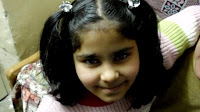Maha and I will begin distributing food packages to families in February. But today, on the last day of January, we are waiting for a man to call us with price estimates for him to put together ration packages of staple foods at a better price than we can get at the marketplace. So, today, I accompanied Maha to visit Muna who requested assistance in paying for prescription medications for the 9 year old daughter, Noura. Maha, in addition to coordinating CRP projects also collects funds from wealthy Iraqi donors in Amman and uses these funds to pay for medical treatments and prescriptions.

Muna is divorced and of her three children, only Noura lives with her. Her two other children – a son and a daughter – live with her ex-husband in Iraq. Muna also is responsible for three of her nieces and nephews who are orphaned. Muna’s nieces and nephew’s father was a policeman in Iraq and killed by a suicide bombing. The children’s mother was traveling between Najaf and Karballa and disappeared. Nothing has been heard from her since and she is assumed dead One of her nieces is divorced and has two small children. Her husband returned to Iraq six months ago because he wanted to work to support his family and found it impossible in Jordan. There has been no word of him since he left.

Nine year old Noura shows us the scars from her last surgery. Her first surgery was paid for by an large aid organization; the second was partially paid for by another organization but Muna had to spend all of the funds she received from the family’s UNHCR monthly cash grant to pay the remainder of the cost. She has no more money.
Noura has a mass of benign tumors throughout her body. Her liver is also compromised. She retains excess liquid in her abdomen. This much we could discern from her mother’s explanation and from pouring over the pile of lab reports and test results Muna brought to us. Much of it is in “medicaleese” and we shake our heads, trying to make sense of it all. All we know if that if she does not get these medications she is liable to get a post operative infection and one of the medications prescribed will help diffuse the fluid build-up which makes it difficult for Noura to sleep at night when it makes it hard for her to breathe.
The living room area we sit in has foam mats lining the walls for furniture. Muna explains that the only other assistance she has received from any organization are these mats; a neighbor provided them with the carpet. The room is clean and attractive because Muna keeps it orderly. Her niece, Ausus, brings in a tray of tea for us to share.
After our tea, we prepare to leave to go to the pharmacy with Muna to buy the prescriptions. First Muna shows us the rest of their apartment. The rooms are large and the cement walls and floor hold the winter chill. We see the one bedroom that Noura, her three cousins and two second cousins share. Then we take a look at the kitchen. One wall is covered with black mold from the dampness. There is no table, only a rickety counter with a sink and very few dishes. The walls lined with plastic containers of various sizes that hold water. Muna tells us that they only get water one day a week and fill the containers on that day for use for the rest of the week. If they run out, they beg water from neighbors to fill the containers.
Water to homes in Jordan is delivered by tank truck to tanks on the rooftops. The expense of getting a tank filled is more than many families can afford. The 15 Jordan Dinars (approximately $21) it costs to fill the tank is beyond Muna’s budget. Water for bathing is scarce and this is another compelling reason to purchase the antibiotics for Noura.

As we walk the narrow streets to the main road to get to the pharmacy, a horse-drawn wagon filled with fuel oil for space heaters passes us. I pull out my camera and the driver obligingly stops for me to take a few photos. 
Amman is a city of contrasts; in many ways it is modern and cosmopolitan; but then, nestled on a vacant lot between modern buildings, it is not uncommon to find a few Bedouin tents and a small flock of sheep and perhaps a donkey or horse, too. In this city of merging populations and rapid modernization, the old exists alongside the new in surprising compatibility. Although Amman does not have the beauty of Damascus or Istanbul, it has its charm. But it is unwelcoming and cold for those forced to live here as non-persons and in deep poverty.

Amman is a city of contrasts; in many ways it is modern and cosmopolitan; but then, nestled on a vacant lot between modern buildings, it is not uncommon to find a few Bedouin tents and a small flock of sheep and perhaps a donkey or horse, too. In this city of merging populations and rapid modernization, the old exists alongside the new in surprising compatibility. Although Amman does not have the beauty of Damascus or Istanbul, it has its charm. But it is unwelcoming and cold for those forced to live here as non-persons and in deep poverty.







